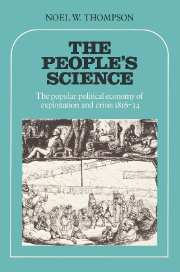Book contents
- Frontmatter
- Contents
- Preface
- Introduction
- 1 Changing attitudes to political economy in the working-class press 1816–34
- 2 The need for a working-class political economy
- 3 Charles Hall and Robert Owen: anti-capitalist and socialist political economy before the Ricardian socialists
- 4 Ricardian socialists/Smithian socialists: what's in a name?
- 5 The theory of labour exploitation and the working-class press 1816–30
- 6 The theory of labour exploitation and the working-class press 1830–34
- 7 Early socialist political economy and the theory of capitalist crisis
- 8 The popular political economy of crisis 1816-34
- Conclusion
- Bibliography
- Index
2 - The need for a working-class political economy
Published online by Cambridge University Press: 14 January 2010
- Frontmatter
- Contents
- Preface
- Introduction
- 1 Changing attitudes to political economy in the working-class press 1816–34
- 2 The need for a working-class political economy
- 3 Charles Hall and Robert Owen: anti-capitalist and socialist political economy before the Ricardian socialists
- 4 Ricardian socialists/Smithian socialists: what's in a name?
- 5 The theory of labour exploitation and the working-class press 1816–30
- 6 The theory of labour exploitation and the working-class press 1830–34
- 7 Early socialist political economy and the theory of capitalist crisis
- 8 The popular political economy of crisis 1816-34
- Conclusion
- Bibliography
- Index
Summary
Scrutiny of the working-class press would suggest, therefore, that by the late 1820s and early 1830s the labouring classes were concerning themselves increasingly with ‘the science which treats of the production and distribution of wealth’ and also that they were determined to use it for critical rather than apologetic purposes. The question arises, then, as to why at both a formal and a popular level, this period should have seen the emergence of an anti-capitalist and socialist political economy.
One possible answer to this question is that the particularly severe economic distress experienced by the labouring classes in the aftermath of the Napoleonic Wars inevitably turned the attention of radical thinkers to matters economic and thence to the discipline of political economy. Such a suggestion does of course raise the vexed question of whether or not working-class living standards were or were not being significantly eroded in this period. However, at the risk of oversimplifying the outcome of a debate which has exercised the minds and engaged the passions of generations of economic historians, it is probably fair to say that in the immediate post-Napoleonic War period particular economic hardship was indeed experienced by large sections of the working population.
- Type
- Chapter
- Information
- The People's ScienceThe Popular Political Economy of Exploitation and Crisis 1816–34, pp. 35 - 64Publisher: Cambridge University PressPrint publication year: 1985



